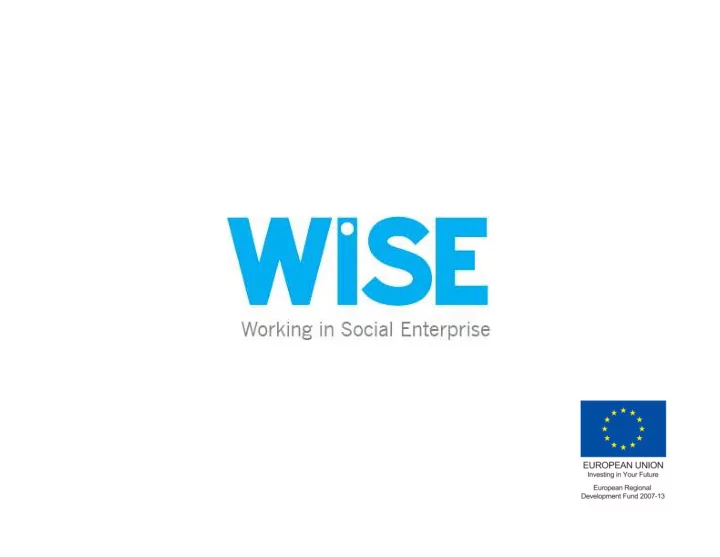

The WISE project was established to support new and existing social enterprises, and voluntary and community groups in Leicester
WISE Partnership WISE is led by CASE (the Co-operative and Social Enterprise Development Agency) and delivered in partnership with: - University of Leicester and - Voluntary Action Leicestershire
Funding and match WISE is primarily funded by ERDF and match funded by the three partner’s own income. Valued at £389,000 and delivered from 1July 2011 to 30 June 2013, the project was designed to build on the success of its predecessor, the Social Enterprise Way, which focussed on the business side of social enterprise
Project Outline WISE is designed to a engage people in Leicester in creating social enterprise businesses. The project also supports growth and development in existing social enterprises
Project Outline WISE specifically aims to increase the number of business start ups in disadvantaged communities in Leicester City The project targets members of disadvantaged communities who might otherwise not engage with business support services.
Project Aims 1. Increased size and diversity of social enterprises 2. Increased sustainable employment 3. Increased graduate retention in Leicester city 4. Increased survival rates for social enterprises 5. Increase in number of voluntary and community organisations becoming social enterprises
Project Outline The project consists of the following linked components: 1. Social enterprise awareness raising seminars 2. Development of a WISE support network for Leicester City 3. Social enterprise capacity building - including workshops and student placements 4. Student and graduate engagement
Six main strands of activity: 1. Delivery of workshops introducing the social enterprise business model to those who have not heard of social enterprises and want to discover more .
Six main strands of activity: 2. Delivery of workshops on a variety of issues that affect established social enterprises, with particular emphasis on sustainability, growth and job creation.
Six main strands of activity: 3. Delivery of one-to-one and group support sessions. 4. Delivery of online resources for social enterprises
Six main strands of activity: 5. Development and maintenance of a social enterprise network within the city. 6. Delivery of student placements within social enterprises
Output measures 1. GVA resulting from businesses improving performance (total GVA and number of businesses improving GVA) 2. Number of businesses assisted to improve performance 3. Number of people assisted to start a business 4. Number of businesses created 5. Number of jobs created
Issues for consideration It can take a long time to research and write an ERDF bid. It is not a process that can be hurried. The WISE partners began to write the application in July 2010. It was submitted in October 2010. Project delivery began in July 2011. Once you have submitted your bid it is very likely that you will be asked a number of questions and be asked to provide further information. This may happen as many as three times as it is important that the assessment team achieve the clearest possible picture of your project.
Issues for consideration Your proposal should be in depth, well researched and validated. You must be able to validate the proposed outputs and outcomes. Outcomes are important but it is usually outputs that are measured.
Issues for consideration Proposals are often written a up to a year in advance and usually project two years into the future. Can cause problems regarding achievement of outputs etc if local, national or global situation changes suddenly e.g. a recession.
Issues for consideration Make use of the experience, support and guidance provided by the ERDF team. Ask questions wherever necessary. The application form is clear on what is required - use the guidelines within the form to steer your application.
Issues for consideration Potential applicants should have robust systems in place to ensure that project delivery, management and administration run smoothly. Don’t apply for ERDF funding if you are averse to paperwork, administration and writing reports.
Issues for consideration Applicants must deliver their projects in strict adherence to the ERDF guidelines. Very little, if any, deviation is allowed. Failure to adhere to the guidelines and requirements may lead to withdrawal of funds.
Issues for consideration Partnerships need time to gel. They are subject to a period of storming, norming and forming before they get to performing. Time needs to be built in to allow for this process. Also bear in mind that projects may need lead in time before building momentum so may not achieve outputs at the start
What beneficiaries say about WISE “WISE has opened my eyes to things I hadn’t thought of regarding my business development” “The encouraging and motivating support given by WISE is so very important to my business”
For further information on WISE visit the partner websites: CASE www.case-da.co.uk University of Leicester www.le.ac.uk Voluntary Action Leicestershire www.valonline.org.uk
�����������������
Co-operative and Social Enterprise Development Agency 1 The Crescent King Street Leicester LE1 6RX 0116 222 5010 Enquiries@case-da.co.uk
Recommend
More recommend